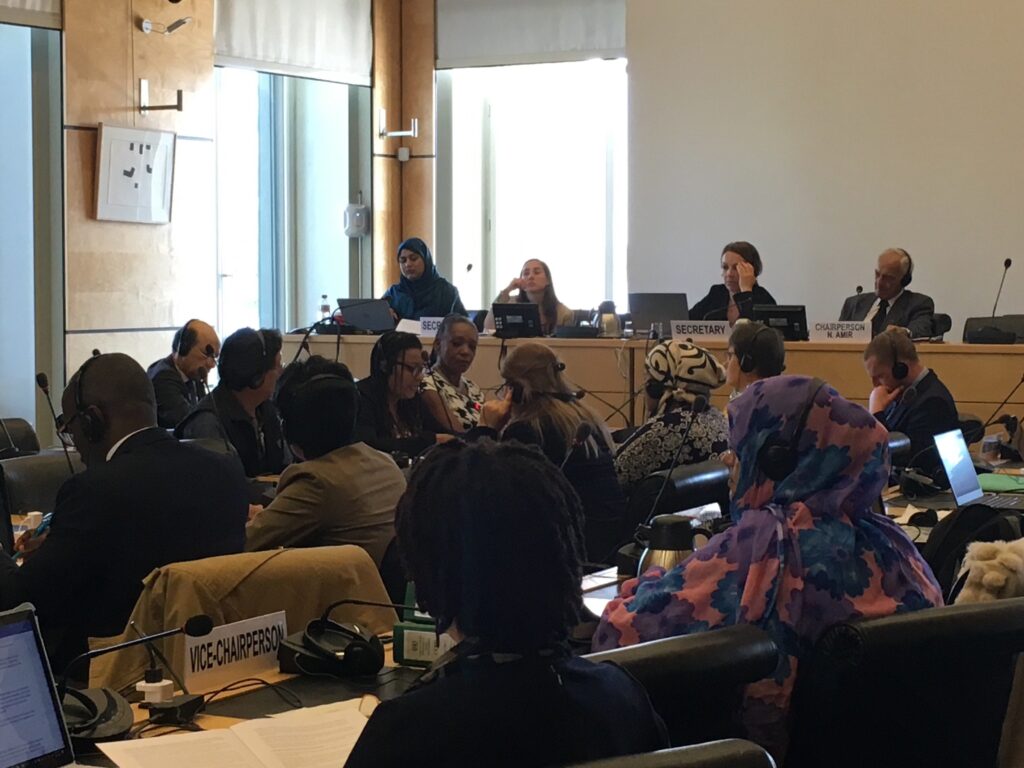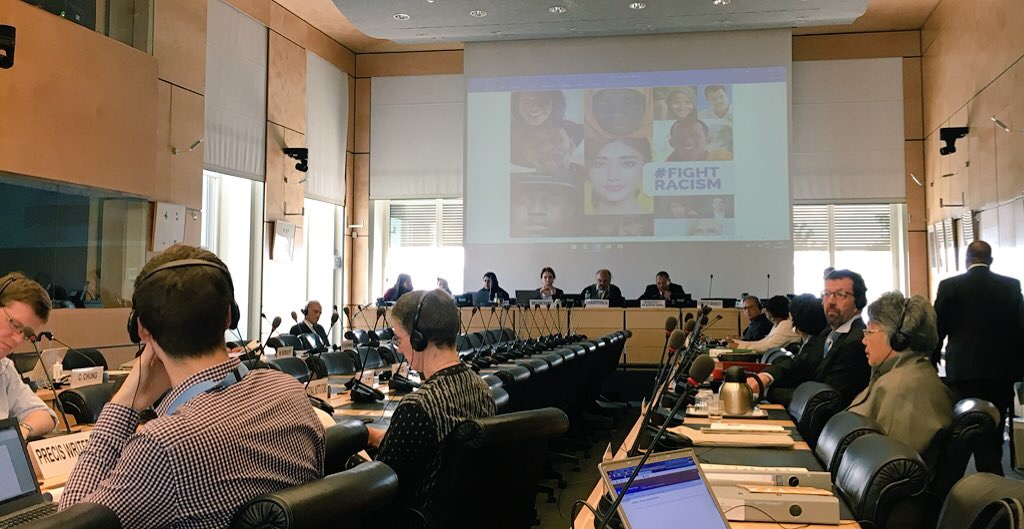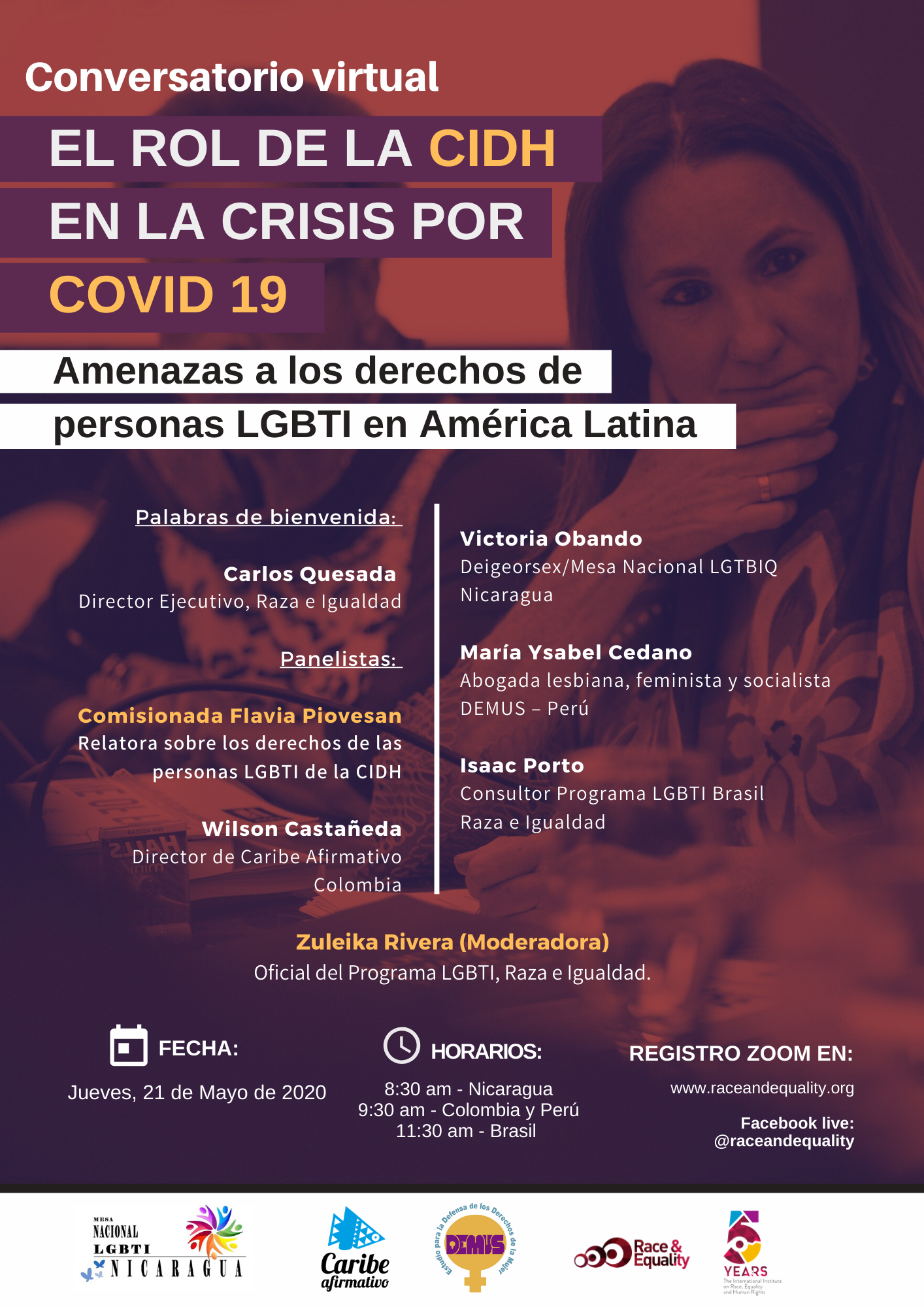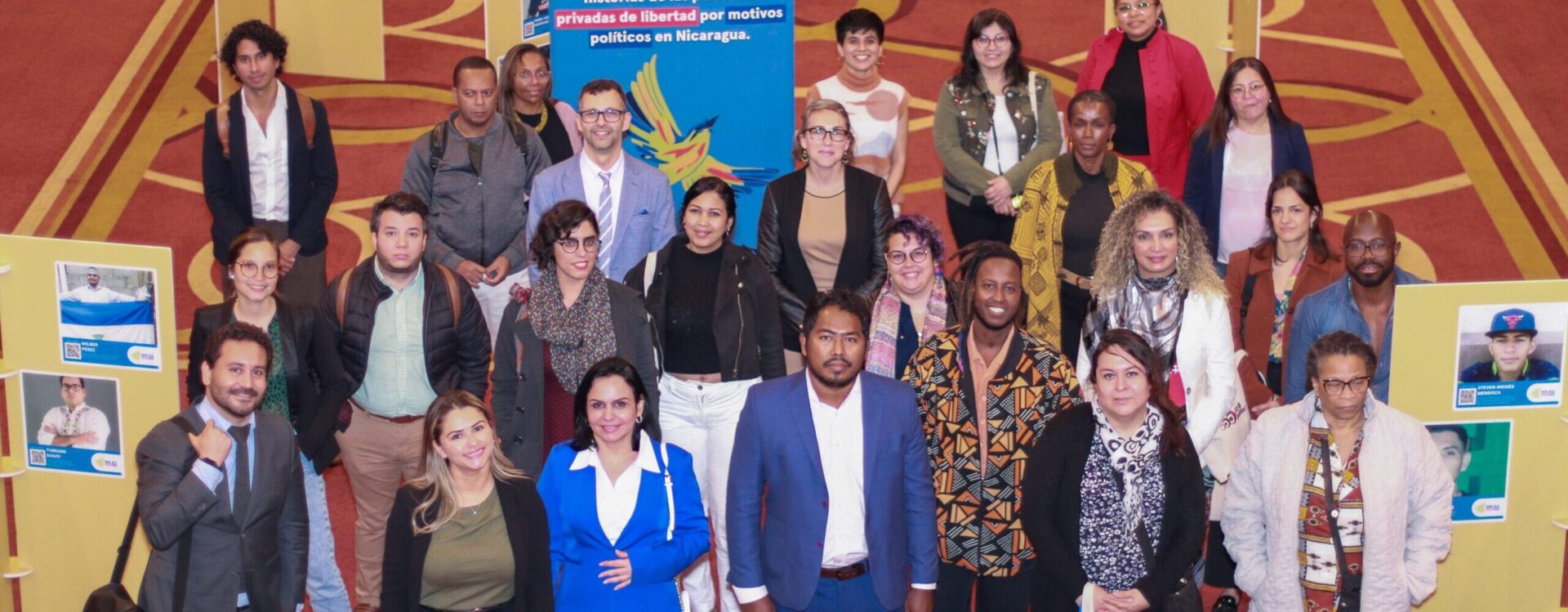El Instituto Internacional sobre Raza, Igualdad y Derechos Humanos expresa su preocupación por la respuesta del Estado brasilero a la progresión del coronavirus en el país.
Brasil, 21 de mayo de 2020. El Instituto Internacional sobre Raza, Igualdad y Derechos Humanos (Raza e Igualdad) está profundamente preocupado por la situación que enfrentan las poblaciones más vulnerables en Brasil en medio de la actual pandemia de COVID-19, que hasta la fecha ha matado a 18.894 personas[1], y que transcurre en medio de una crisis política que refleja las desigualdades estructurales que deben enfrentar las comunidades marginadas cotidianamente. El 19 de mayo, el país alcanzó la marca de 1000 muertes en un solo día[2].
Desde el brote del virus, el presidente Jair Bolsonaro ha amenazado constantemente la democracia brasilera. Recientemente, participó en manifestaciones que solicitaban el cierre del Congreso Nacional y el Tribunal Federal Supremo (STF)[3], así como el restablecimiento de la Ley Institucional No. 5 (A I-5)[4], un decreto que incrementó el poder de la dictadura militar de Brasil en 1968 y autorizó la expedición de varias medidas excepcionales.
La pandemia llega al país de cara a una intensa crisis política, agravada por un presidente que ha renunciado a su responsabilidad como jefe del Poder Ejecutivo, quien ha alentado el desacatamiento de la medida de distanciamiento social, yendo en contra de las recomendaciones de la Organización Mundial de la Salud (OMS)[5]. Bolsonaro además ha acusado a la OMS de “alentar” la masturbación y la homosexualidad en niños de cero a cuatro años, en lo que se considera un intento LGBTIfóbico de desprestigiar a la organización[6].
Para empeorar las cosas, mientras el país se convertía en el epicentro de la pandemia en América Latina[7], se le preguntó al presidente sobre el número de muertos de COVID-19 en el país, a lo que respondió: «¿Y qué? lo siento ¿qué quieres que haga?”, señalando que él no podía hacer milagros[8].
Uno de los puntos más tensionantes de la crisis política en Brasil durante la pandemia fue la renuncia del ministro de Salud, Henrique Mandetta Mandetta quien fue reemplazado por Nelsol Teich[9]. Además del hecho de que el Sr. Teich fue una elección problemática debido a sus lazos con compañías privadas de seguros[10] y sus puntos de vista conservadores[11], Mandetta estaba jugando un papel importante alentando a la población brasilera a practicar el distanciamiento social. Para este tiempo, el presidente Bolsonaro insistía en que la economía no debía detenerse y sugirió la medida de «aislamiento vertical«, donde solo una parte de la población estaría aislada. Como resultado, los estados brasileros han rechazado las pautas del gobierno federal, generando que la información sea descoordinada[12].
Además, el presidente insiste en usar el tratamiento no probado de cloroquina para asegurarse que la población pueda regresar a trabajar, al considerarlo un tratamiento fácil contra el COVID-19. Esta actitud hizo a Nelson Teich, el Ministro de Salud nombrado, seguir los pasos de Mandetta y renunciar sin siquiera haber completado un mes en el cargo. Hasta la fecha, aún no se ha definido quién será la próxima persona en ocupar el puesto[13].
Al defender el aislamiento vertical, Bolsonaro parece ignorar las condiciones de vida de una gran parte de la población. Muchas personas viven en barrios marginales, a menudo en casas extremadamente pequeñas y/o compartidas por varios miembros de la misma familia. Teniendo en cuenta la facilidad con la que el virus se multiplica en estos ambientes, los incentivos de Bolsonaro parecen ignorar que este aislamiento ha hecho que el número de muertes se dispare en Brasil, con una mayor proporción de muertes en la población afrobrasilera.
Entre el 11 y el 26 de abril, las muertes causadas por COVID-19 entre la población blanca disminuyeron de 62.9% a 52.3%, mientras que las muertes entre la población afrobrasilera aumentaron de 33.5% a 45.2%[14]. Durante este período, el número de afrobrasileros que murieron a causa de COVID-19 aumentó de 180 a 933, lo que evidencia las actuales desigualdades raciales. En el estado de Amazonas, donde el sistema de salud ya está colapsando, los datos del 29 de abril muestran que de 850 de los que pacientes que estaban en estado crítico, la mayoría eran afrobrasileros, teniendo en cuenta que apenas 81 eran blancos. De las personas que han muerto, 343 son afro brasileras y 25 son blancas.
67% de los brasileros que dependen exclusivamente del sistema de salud pública, el SUS (Sistema Único de Salud), son Afrodescendientes. La mayoría de estos pacientes sufren de diabetes, tuberculosis, hipertensión y enfermedades renales crónicas, todas condiciones que se agravan con el COVID-19. En Río de Janeiro, por ejemplo, los barrios bajos sobrepoblados tienen las tasas más altas de tuberculosis[15]. Se cree que el SUS ya se encuentra en la primera fase de colapso, poniendo a esta gente en riesgo de no tener acceso a la atención médica.
Lúcia Xavier, de la organización de Afromujeres “Criola” , recuerda que una gran parte de estas consecuencias están vinculadas a cuestiones socio-raciales, como la falta de saneamiento básico, las condiciones de vivienda , o el suministro inadecuado de alimentos[16]. En otras palabras, el racismo estructural ha impuesto consecuencias negativas en la salud de la población Afrodescendiente, que empeoran y se vuelven más evidentes en el medio de la pandemia.
A pesar de estas realidades, cuando se le preguntó sobre el tema, el Ministerio de Salud declaró que no hay «estudios técnicos o científicos que apunten al color o la raza como un factor de riesgo para la enfermedad», ignorando cómo las desigualdades raciales modulan el acceso a la salud en Brasil[17].
Las mujeres también experimentan consecuencias específicas del coronavirus. Un estudio realizado por el Foro Brasilero de Seguridad Pública (FBSP)[18] en el que se monitorearon las redes sociales, registraron un aumento en la tasa de violencia doméstica en seis estados brasileros (Acre, Mato Grosso, Pará, Rio Grande do Norte, Rio Grande do Sul y São Paulo) . El estudio también se observó que las mujeres en situación de violencia tienen dificultades de acceso a las instituciones públicas para registrar las quejas.
El número de feminicidios aumentó, lo que indica un aumento de la violencia doméstica. En São Paulo, por ejemplo, comparando los meses de marzo de 2019 y marzo de 2020, el número de estas muertes aumentó en un 46%. En la primera quincena de abril, los casos se duplicaron en comparación con el año anterior. En Acre, durante el mismo período, los casos crecieron un 67%[19].
La población transgénero y travesti también están experimentando impactos desproporcionados de COVID-19. Alrededor del 90% de las mujeres travestis y transexuales en Brasil utilizan el trabajo sexual como su principal fuente de ingresos[20] y, por lo tanto , no puede seguir las pautas de aislamiento social sin renunciar a su sustento para sobrevivir . Ha habido varios informes de grupos que las explotan y obligan a transexuales y travestis que ejercen la prostitución a seguir trabajando[21].
La grave situación en la que se encuentran las mujeres travestis y transexuales en Brasil se refleja en los datos publicados en un boletín reciente de ANTRA, la Asociación Nacional de Travestis y Transexuales de Brasil. En los primeros cuatro meses de 2020, hubo un aumento de aproximadamente el 48% en los asesinatos de personas trans en Brasil en comparación con el mismo período en 2019[22]. De enero a abril de 2019, 43 personas transgénero fueron asesinadas en Brasil, mientras que, durante el mismo período en 2020, hubo 64 asesinatos. Al aislar los meses de marzo y abril, para comparar específicamente el período inicial de la pandemia, hubo un aumento del 13%. Este escenario demuestra cuán violenta es la sociedad y el Estado brasilero hacia las personas trans, que quedan aún más desprotegidas durante la pandemia.
Finalmente, es extremadamente impactante que incluso durante la pandemia, la policía en Brasil continúe cometiendo intensos actos de violencia. El 19 de mayo, el asesinato del joven afrobrasilero João Pedro de 14 años conmocionó al país. Fue asesinado mientras jugaba dentro de su casa durante una operación policial en Morro do Salgueiro , ubicada en la comunidad de São Gonçalo en la región metropolitana de Río de Janeiro[23]. La policía brasilera continúa actuando de manera racista. Las personas que viven en favelas son en su mayoría afrodescendientes y son tratadas como delincuentes como si sus vidas tuvieran menos valor. La policía no actúa de esta manera hacia la población blanca que vive en áreas acomodadas y que no tiene barreras para practicar el aislamiento social.
En un país como Brasil, donde el racismo y la LGBTIphobia estructurales crean jerarquías profundas y desventajas para la población AfroLGBTI en relación con el derecho a la vida, la dignidad y la integridad, la negligencia y la falta de compromiso por parte del presidente Jair Bolsonaro en la lucha contra la pandemia podría generar consecuencias extremadamente graves e irreversibles para estas poblaciones vulnerables.
A la luz de esta situación, Raza e Igualdad recomienda al Estado brasilero que tome medidas para proteger a estas poblaciones, tales como:
- Refuerzo inmediato de las medidas de aislamiento social;
- Garantice productos básicos de higiene a quienes viven en regiones sin acceso a saneamiento;
- Promueva campañas de concienciación sobre los riesgos de coronavirus, en especial para aquellas comunidades en situación de mayor vulnerabilidad;
- Adopte y difunda mecanismos de denuncia en línea para la violencia doméstica, alentando a personas cercanas a la víctima a usar estos recursos si notan signos de agresión. Estas campañas deberían abarcar tanto a las mujeres cisgénero como a las mujeres trans;
- Proporcione espacios donde las víctimas de violencia doméstica puedan cumplir con el aislamiento social lejos de sus agresores;
- Desmontar redes de explotación sexual, con el apoyo de las organizaciones LGBTI y las trabajadoras sexuales, para garantizar la posibilidad de cumplir con el aislamiento social;
- Identifique de inmediato a los autores de feminicidios y asesinatos de mujeres travestis y transexuales, aclarando los hechos en los tribunales de justicia.
- Reevalúe la necesidad de operaciones de la policía en los barrios marginales, especialmente durante este período de empeoramiento de la pandemia.
Raza e Igualdad insta al Estado brasilero a garantizar la dignidad de su población, fortalecer el sistema de salud y difundir información para la prevención del COVID-19, con especial atención a las personas más vulnerables, tales como las mujeres y las personas LGBTI afrodescendientes, para que sus derechos no queden desprotegidos durante esta crisis.
[1] Noticias Google. Disponible en: https://news.google.com/covid19/map?hl=pt-BR&mid=%2Fm%2F015fr&gl=BR&ceid=BR%3Apt-419
[2] G1. Casos de coronavirus y número de muertes en Brasil el 19 de mayo. 19 de mayo de 2020. Disponible en: https://g1.globo.com/bemestar/coronavirus/noticia/2020/05/19/casos-de-coronavirus-e-numero-de-mortes-no-brasil-em-19 -de-maio.ghtml
[3] BBC. Bolsonaro participa una vez más en un acto criticando a la Corte Suprema y al Congreso. 3 de mayo de 2020. Disponible en: https://www.bbc.com/portuguese/brasil-52518123
[4] Ato Institucional nº 5, del 13 de diciembre de 1968. Disponible en: www.planalto.gov.br/ccivil_03/ait/ait-05-68.htm
[5] Organización Mundial de la Salud. Asesoramiento para el público sobre la enfermedad por coronavirus (COVID-19). Disponible en : https://www.who.int/emergencies/diseases/novel-coronavirus-2019/advice-for-public
[6] Época . Bolsonaro distorsiona la publicación y acusa a la OMS de alentar la masturbación y la homosexualidad en los niños. 30 de abril de 2020. Disponible en: https://epoca.globo.com/brasil/bolsonaro-distorce-publicacao-acusa-oms-de-incentivar-masturbacao-homossexualidade-em-criancas-1-24403161
[7] Uol. Epicentro de la pandemia en América Latina, Brasil preocupa a los vecinos. 6 de mayo de 2020. Disponible en https://noticias.uol.com.br/ultimas-noticias/afp/2020/05/06/epicentro-da-pandemia-na-america-latina-brasil-preocupa-vizinhos.htm
[8] G1. ‘¿Y? Lo siento. ¿Qué quieres que haga? ‘, Dice Bolsonaro sobre las muertes por coronavirus; «Soy el Mesías, pero no hago milagros». 28 de abril de 2020. https://g1.globo.com/politica/noticia/2020/04/28/e-dai-lamento-quer-que-eu-faca-o-que-diz-bolsonaro-sobre-mortes -por-coronavirus-no-brasil.ghtml
[9] Uol. Mandetta es despedido del Ministerio de Salud por el presidente Bolsonaro. 16 de abril de 2020: https://noticias.uol.com.br/saude/ultimas-noticias/redacao/2020/04/16/mandetta-demissao-ministerio-da-saude-bolsonaro.htm
[10] Rede Brasil Atual. Bolsonaro indica que ministro es financiado por planes de salud e investigado por fraude. 21 de noviembre de 2018: https://www.redebrasilatual.com.br/politica/2018/11/bolsonaro-indica-ministro-financiado-por-planos-de-saude-e-investigado-por-fraude/
[11] Mandetta declaró previamente que las campañas de VIH / SIDA no deben incluir nada que ofenda a las familias, como fotos de personas LGBTI.
[12] O Estado de São Paulo. Representantes estatales y municipales rechazan las «Directrices» sobre cuarentena del Ministerio de Salud. 11 de mayo de 2020. https://saude.estadao.com.br/noticias/geral,representantes-de-estados-e-municipios-rejeitam-diretrizes-do-ministerio-da-saude-sobre-quarentena,70003299073
[13] Folha de São Paulo. Después del ultimátum de cloroquina, Teich renuncia al Ministerio de Salud . 15 de mayo de 2020. https://www1.folha.uol.com.br/equilibrioesaude/2020/05/apos-ultimato-sobre-cloroquina-teich-pede-demissao-do-ministerio-da-saude.shtml
[14] Pública. En dos semanas, el número de negros muertos por coronavirus es cinco veces mayor en Brasil. 6 de mayo de 2020. https://apublica.org/2020/05/em-duas-semanas-numero-de-negros-mortos-por-coronavirus-e-cinco-vezes-maior-no-brasil/#Link3
[15] https://www.abrasco.org.br/site/outras-noticias/sistemas-de-saude/populacao-negra-e-covid-19-desigualdades-sociais-e-raciais-ainda-mais-expostas / 46338 /
[16] Folha de São Paulo. Entre los casos identificados, covid-19 es más mortal entre los negros en Brasil, según los datos. https://www1.folha.uol.com.br/cotidiano/2020/04/coronavirus-e-mais-letal-entre-negros-no-brasil-apontam-dados-da-saude.shtml
[17] Pública. En dos semanas, el número de negros muertos por coronavirus es cinco veces mayor en Brasil. 6 de mayo de 2020. https://apublica.org/2020/05/em-duas-semanas-numero-de-negros-mortos-por-coronavirus-e-cinco-vezes-maior-no-brasil/#Link3
[18] Foro Brasileiro de Segurança Pública. Nota técnica: violencia doméstica durante la pandemia COVID-19. 16 de abril de 2020. forumseguranca.org.br/wp-content/uploads/2018/05/violencia-domestica-covid-19-v3.pdf
[19] Ibid, página 11.
[20] https://antrabrasil.files.wordpress.com/2020/01/dossic3aa-dos-assassinatos-e-da-violc3aancia-contra-pessoas-trans-em-2019.pdf
[21] RD News. La exploración de cafetinas obliga a las trans a romper la cuarentena y continuar en la calle. 22 de marzo de 2020. https://www.rdnews.com.br/cidades/exploracao-das-cafetinas-obriga-trans-a-descumprir-quarentena-e-continuar-na-rua/125737
[22] Asociación Nacional de Travestis y Transexuales de Brasil – ANTTRA. Boletín nº 02/2020. Assassinatos contra travestis e transexuais em 2020. https://antrabrasil.files.wordpress.com/2020/05/boletim-2-2020-assassinatos-antra.pdf
[23] G1. La muerte del adolescente João Pedro durante la acción policial causa conmoción en la web. 19 de mayo de 2020. https://g1.globo.com/rj/rio-de-janeiro/noticia/2020/05/19/morte-do-menino-joao-pedro-durante-acao-policial-causa-comocao -na-web.ghtml





